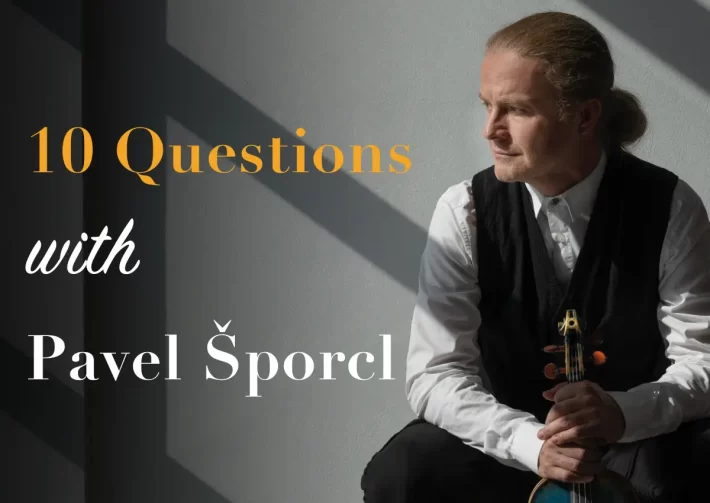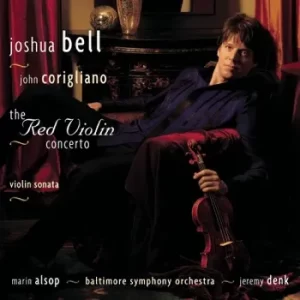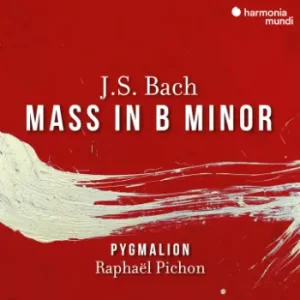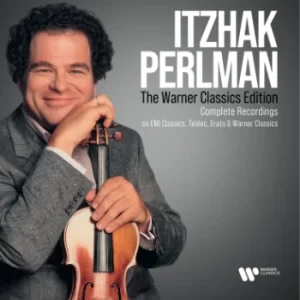Violinist Pavel Šporcl answers The Classic Review’s 10 questions.
Where will he most likely find inspiration? How many hours does he practice each day? And what is the classical music albums he couldn’t live without?
What new repertoire are you currently working on?
The violin repertoire is so vast that it’s almost impossible to ever “finish” it — there’s always something new to discover. But I like having clear goals. This season, my main focus is on the Paganini Caprices. I haven’t performed all of them yet, so I’ve set myself a personal challenge: to learn every single Caprice and perform the complete cycle in concert. I already have a date — August 30th (2026) — when I’ll play all 24 live, and that makes me incredibly happy.
Because I’m running a six-concert Paganini series in Prague, I’m also diving into more Paganini works, as well as some pieces by Schubert. Schubert wrote both of his violin Rondos (and other violin pieces) for Josef Slavík, the Czech violin prodigy who was a close friend of Paganini, so the connection is very natural.
At the same time, I’m constantly expanding my crossover repertoire and exploring modern styles. I love playing contemporary music, so next year I may take on a modern violin concerto as well. I’m always excited to learn something new.
What’s a piece of music you don’t currently play but wish you could?
To be honest, I don’t think about this question very often. I play 80–90 concerts each season, and my repertoire ranges from the core of classical music to crossover and my gypsy projects. So my musical life is already wonderfully full.
But if I had to choose, I would love to perform more of the big romantic concertos again — Tchaikovsky, Brahms, and Sibelius. These are masterpieces I adore, and some of them I simply haven’t played much recently.
Are there any classical composers whose music you don’t quite connect with?
I have to admit that I never truly connected with the Second Viennese School. I know some people might find that upsetting or difficult to understand, and maybe it’s also because I haven’t played a huge amount of that repertoire. But that kind of music simply doesn’t speak to me.
The same goes for pieces where there is no recognizable melody at all. Music can be modern, absolutely — I love contemporary works — but for me there still has to be some feeling, some line, some sense of direction. I don’t need it to be romantic, not at all. But if it’s just a cluster of sounds without melody or structure, then I struggle to connect with it, and I think the audience does too.
This is one of the reasons why, historically, people drifted away from classical concerts. At a certain point, a lot of contemporary classical music became so abstract and atonal that the public felt left behind. Meanwhile, pop music was filled with melodies — and people naturally followed what they could connect with.
Today, thankfully, many contemporary composers write in a way that is modern, fresh, rhythmically exciting, but still emotionally accessible. That, I believe, is the direction classical music needs to take if it wants to stay alive and connected to the audience.
What was the latest contemporary music piece that impressed you?
I’ve always enjoyed playing contemporary music because it gives me freedom — there isn’t the same historical weight, and you can really explore what the violin can do. In the violin world, I’ve been impressed by quite a few contemporary works. I really like John Corigliano’s Violin Concerto (“The Red Violin”) and his Sonata — both are powerful and brilliantly written for the instrument.
I also collaborate very often with the Czech composer Lukáš Sommer, who writes and arranges for me. He has created incredible violin concertos, symphonies, operas — he’s truly one of the most versatile and imaginative composers I know.
Another composer whose work I admire is Sylvie Bodorová. She wrote a beautiful violin concerto some years ago, and I still find it very moving.
How much time do you dedicate to practicing each day? What are your best tips for developing effective practice habits?
I usually practice three to four hours a day. It’s simply part of my life, and I genuinely love practicing the violin. I always start with a bit of technique — scales or exercises like Ševčík — and this year I move straight into the Paganini Caprices. After that, I work on whatever repertoire I’m preparing at the moment.
For me, the most important thing is slow, mindful practice: being relaxed, friendly to my body, aware of every note and movement. Longevity is essential. If you look at my greatest model, Itzhak Perlman — whom I was lucky to study with — he plays wonderfully at 80, even with all the physical challenges he has faced. Or Heifetz and Milstein, who also played brilliantly well into their 80s. I want to go that far too.
So I’ve always thought about prevention — keeping my body and mind healthy. I do exercises every morning, I take some supplements for focus and brain health, and I really try to stay in good shape. That way I can play my concerts at 100% and give the audience everything I have.
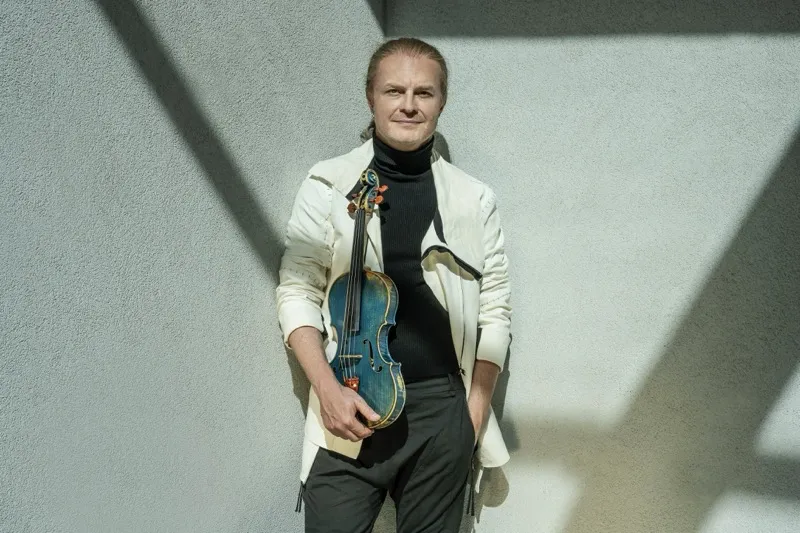
Pavel Šporcl (images: ©️ Lenka Hatašová)
How do you find inspiration when performing?
For me, inspiration is something very natural. I try to be as well prepared as possible for my concerts, and even before I step on stage I’m already thinking about the audience — sending them my energy, my feelings, hoping we will meet on the same wavelength the moment I appear. And usually, when I walk on stage and see their smiling faces and feel their excitement, that’s all I need. That mutual connection is the biggest inspiration.
But I can be inspired even at home. When I practice, I often imagine I’m in a concert hall. I try to play with full commitment — 100%, as if people were sitting right in front of me. When you practice like this, stage presence becomes natural. Of course you still rehearse, prepare, go through the routines — sometimes even the boring ones — but that’s how you build freedom.
And then the music itself takes over. Music is a beautiful craft; it connects you with something higher. I feel connected with my violin, with the wood, with nature. Playing can be a form of meditation. So for me, finding inspiration is actually easy — I’m very fortunate that what I do is so deeply tied to beauty, emotion, and the joy of sharing music with others.
Do you experience performance anxiety? If so, how do you manage it?
I was lucky enough to seldom be nervous on stage. When I was a child, I once asked my mother what would happen if I made a mistake. She simply said, “Nothing.” And later I realised she was right — the sun will still rise the next morning, the world will go on. Of course it’s important not to make mistakes, and that’s precisely why I prepare so carefully for my concerts.
On stage anything can happen — someone’s phone might ring, someone might clap in the wrong place, sneeze, a fly might land on your violin — things you simply can’t control. So you have to be focused, prepared, and able to enjoy the moment no matter what. I always want to feel 100% ready.
In my whole life, I’ve probably been genuinely nervous five times. Fortunately, it never ruined a concert. And actually, if I ever feel a bit of anxiety, it often gives me an extra spark — more intensity, more inspiration, more drive to communicate what I want to say with the music.
“There is a considerable imbalance between the years of dedication musicians put in and what society rewards. That is simply the reality.”
If music wasn’t your passion, what other career path might you have chosen?
I’ve played the violin for so many years that it feels completely natural to me. But if I didn’t play the violin, I’m sure I would still stay in the world of music somehow.
When I was little, of course I dreamed of being an astronaut or a football player — I was very fast, and I wasn’t stupid, so I think I would have managed well in life anyway. But the truth is that this path was meant for me. I’ve always had a strong imagination and a desire not only to follow traditions, but also to reshape them.
That’s why I used to perform in a bandana, and why I play on my blue violin. I’ve always wanted to inspire, to teach, to change things — even if it sometimes upsets people. When I started doing these things 25 years ago, many colleagues, musicologists, even conductors were shocked. Today nobody would care, but back then it was new, maybe too early, and I was one of the first to push those boundaries.
So if I weren’t a violinist, I would probably still be someone who teaches, inspires, creates, and challenges the norm. That’s simply who I am — and that’s the path I feel most at home on.
What advice do you have for young musicians starting their careers?
Building a musical career has never been easy — and today it’s probably harder than ever. As in any profession, preparation and luck both play a significant role. There are so many great musicians now. The level of education, teaching, and methodology — especially for violin — has become incredibly global. Wonderful players come from every corner of the world.
Many of the things I struggled with as a young student are handled effortlessly by young violinists today. The overall level is extraordinary. And for that reason, it’s really challenging to stand out and become a soloist. Of course, you can play in an orchestra, and many musicians love that. You can teach, which is a passion for many. But making a living as a musician is tough.
Imagine practicing your instrument since the age of four or five — your whole life — and then realizing you may earn less than someone who just started a TikTok account, or someone in IT or AI. There is a considerable imbalance between the years of dedication musicians put in and what society rewards. That is simply the reality.
But despite all of this, there is one essential piece of advice: be prepared — and never stop trying.
You will fall, you will fail, you will face disappointment. Everyone does. But you must get up, again and again. You might go to ten auditions, or fifty, or a hundred — and maybe the 101st will be the one that changes everything.
Persistence is everything. Stay focused on your goal, keep rising after every fall, and always be prepared for the moment when your opportunity finally arrives.
What classical music album you couldn’t live without?
People sometimes ask me which three pieces of music I would take to a deserted island, and the first thing that always comes to my mind is Bach’s Mass in B minor. Bach’s music feels perfect — no wrong notes, no wrong ideas. I absolutely love this work — it’s like my musical foundation. Also, I would certainly want to listen to recordings of Heifetz and Perlman.
* * *
Pavel Šporcl’s new album ‘Air‘ is now out on Universal Music. It includes Bach works for violin and orchestra, including violin concertos in E major and A minor, the concerto for violin and oboe in D minor, and the first-ever recording of the concerto for two violins in D minor featuring an oboe instead of the first violin solo part.
Visit Pavel Šporcl’s website, and his feeds on Facebook, Instagram, and YouTube.

